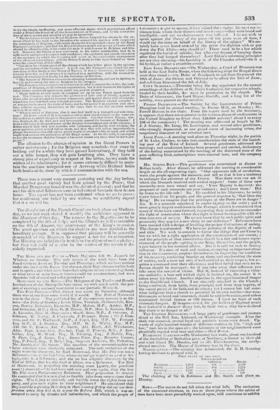Ma. SPRING RICE.—This gentleman was entertained at dinner in
Belfast lately. After dinner, lie addressed the meeting at considerable length on the all-engrossing topic. ".Our opponents talk of revolution, warn the people against the measure, and tell us that it has a tendency to endanger the existence of the Crown. Was there ever one act in which the Monarch received such cordial support ? Some of these new
monarchy-men turn round and say, Your Majesty is deceived: the proposers of such measures are your enemies ; don't trust. them.' Did he listen to the idle tale ? No. He confided in his Ministers; he nobly threw hints.,lf on his people, and the general response is, 'God bless the King.' Do we imagine that the privileges of the Peers are in danger ? No. It is a measure calculated to confer dignity on the order ; and it must greatly inspire confidence in the Peerage, when it is considered that many of thent have come forward, expressing their readiness to surrender the right of nomination where that right is l'ound incompatible with the true interests of society. Do we not know that by such public spirit and generosity they acquire a new claim to our deference Reformers have been taunted with a design of levelling the pr.;per distinctions of society. The charge is unfounded. 11'e have no jealousy of the dignity of rank and title. we wish to concede to Caesar the things dint are Caesar's; but we wish for a right application of the canstitutioo of our country ; and the principle of that constitution should lay a fair and honest repre- sentation of the people—giving to the KinR. die lit:bit,s, and the people, it just balance in the national ;atlas. But it is said we seek to destroy influence. Ira man of rank and station, occupying an important situa- tion in the community, employs his inthtenca in improving the condition of his tenantry, conferring benefits tut them, and ameliorating the state of society, such a man not only if well entitled to their respect, but ac- quires a command ever their affections; and God forbid that such an in- fluence should be destroyed : for if you take away that influence, you take away the reward of virtue. But if, instead of exercising a virtu- ous authority, a base and wicked right is insisted on,. the sooner it is taken away the better. Another Objection is, the apprehension of danger to the Estahlisited Church. I am sincerely attached to the Church ; being convinced, from habit, from principle, and from deep inquiry, of the sacred purity of its faith and doctrines ; yet I cannot but feel some- what indignant that a church so powerful in its own merits—that esta- blisioneats so loved and venerated, should be said to beeadangered unless entrenched behind Gatton or ()Id Sarum. I have no fears of such visionary dangers. If dangers exi,ted, the fre holders of England would have been aide to discover them; but, by their votes, they have declared that there is no danger at all." THE REFoicazits.—A large party of gentlemen and yeomen dined at the Bell Inn, Liskeard, uu Wednesday sennight. After the cloth was removed, several loval and patriotic toasts were drunk. Up- wards of eight hundred females of different stations in life, " high and low," took tea in the open air ; the labourers of the neighbourhood were plentifully regaled with beer and cider.-1I-est Briton. B%aKsatnn Ei.eeetox.—On Wednesday last week, about one hundred of the freeholders of Berkshire gave, at Newbury, a dinner to their old and tried friend Mr. Dundas, and to :de Throekinorton, the newly- elected menther. The Mayor of Newbury was in the chair.
Nmernaer reN.—The scrutiny has termineted, Sir R. H. Gunning having declined to proceed with it.
Final STATE OF TEE Cod. %
Votes rejected on
tine Robinson 1,3S3 Saturday. -Result.
115
1,157 1,GSS
11,21)7790 Gunning 1,241 . 54 ..
104
Lyon 191 6 .. ies The chairing of Sir G. Robinson and Mr. Smith took place-on
Monday.


























 Previous page
Previous page